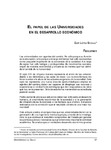| dc.contributor.author | López Badillo, Emir | |
| dc.date.accessioned | 2018-09-03T17:27:12Z | |
| dc.date.available | 2018-09-03T17:27:12Z | |
| dc.date.issued | 2013-01 | |
| dc.identifier.issn | 1665-8639 | |
| dc.identifier.uri | http://repositorio.lasalle.mx/handle/lasalle/552 | |
| dc.description.abstract | Las universidades son agentes del cambio. No sólo porque su función es la educación, sino porque a lo largo del tiempo han sido reconocidas como una parte importante de la conciencia de la sociedad. A lo largo de siglos han sido testigos y protagonistas de movimientos sociales, origen de modelos económicos y creadoras de mentes que han definido el sentido de la humanidad.
El siglo XXI de ninguna manera representa el envío de las universidades a las bibliotecas y las aulas de clase. Los nuevos tiempos les llevan a estar a la altura de las actuales exigencias de la sociedad. Este siglo les representa una nueva área de oportunidad para erigirse en agentes del cambio; deben ser capaces de desplegar sus recursos y experiencias en el diseño de estrategias que den respuestas a los retos que hoy se le presentan. Sólo de esta forma mantendrán su acreditada posición social.
Particularmente ahora sus esfuerzos deben ser enfocados al desarrollo humano, al crecimiento económico de la sociedad y a la generación de infraestructuras funcionales a los tiempos que vivimos. Esfuerzos realizados con la convicción que el resultado construirá una mejor humanidad.
Este artículo analiza el compromiso que las universidades tienen en la generación de una ingeniería mexicana propia, a través de la investigación; lo que conlleva al ineludible compromiso del Estado por generar las políticas púbicas necesarias que prioricen esta importante actividad académica. Se analiza que un verdadero desarrollo económico precisa el desarrollo tecnológico y este a su vez debe darse en las universidades: centros creadores de conocimiento, a través de la investigación. / The Universities are agents that generate changes. Not unique because of its function is the education, because through the time they were recognized as an important part of the society’s conscience. For centuries they have been witness and protagonist of social changes, origin of economic models and creators of minds that have defined the sense of the humanity.
The XXI century not means the universities will be sended to the libraries or the classrooms only. The new times lead them to stay at the top of social demands. This century represents a new age of opportunities to become in agents of change; they have to spread its resources and experiences in the design of strategies to give answers to the challenges. Only by this way they will continue with its social prestige.
Now the universities will have to focus its efforts in order to accelerate human development, social economic advances and the creation of functional structures according to this age. Efforts made with the conviction that the result will build a better humanity.
This item analyze the compromise of the universities have in the creation of an own Mexican engineering, through the proper research; it´ll lead to the State compromise to generate the necessaries public politics according to the importance of this academic activity. So we can affirm the real economic development depends of the technological advances and this event begins inside the universities: creator centers of knowledge based on research. | es_MX |
| dc.format | pdf | es_MX |
| dc.language.iso | spa | es_MX |
| dc.publisher | Universidad La Salle, Facultad de Derecho | es_MX |
| dc.rights | Acceso abierto | es_MX |
| dc.rights.uri | http://creativecommons.org/licenses/by-nc-nd/4.0 | * |
| dc.subject | Educación superior | es_MX |
| dc.subject | Investigación | es_MX |
| dc.subject | Políticas públicas | es_MX |
| dc.subject.classification | HUMANIDADES Y CIENCIAS DE LA CONDUCTA::PEDAGOGÍA::ORGANIZACIÓN Y PLANIFICACIÓN DE LA EDUCACIÓN::ORGANIZACIÓN Y DIRECCIÓN DE LAS INSTITUCIONES EDUCATIVAS | es_MX |
| dc.title | El papel de las universidades en el desarrollo económico | es_MX |
| dc.type | article | es_MX |
| dc.audience | generalPublic | es_MX |







